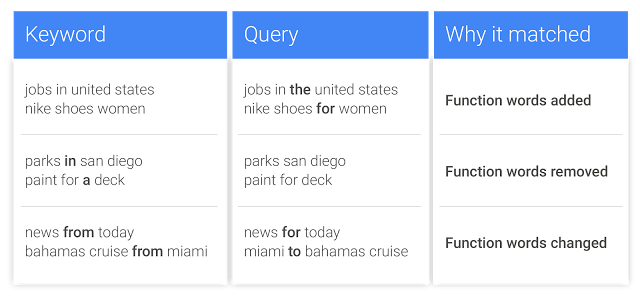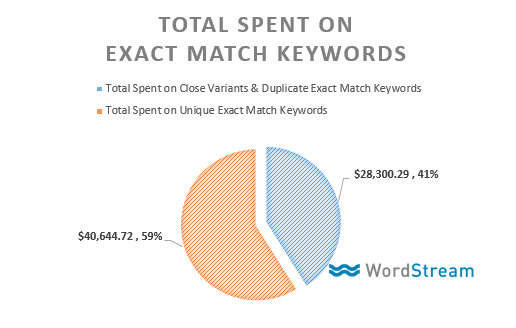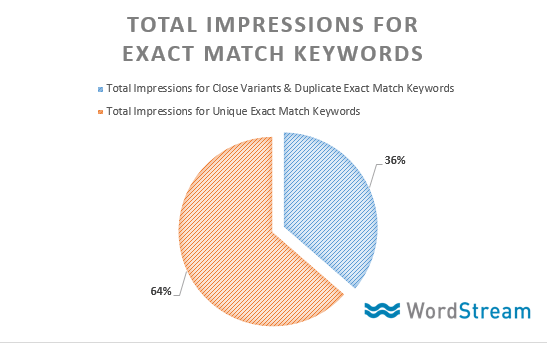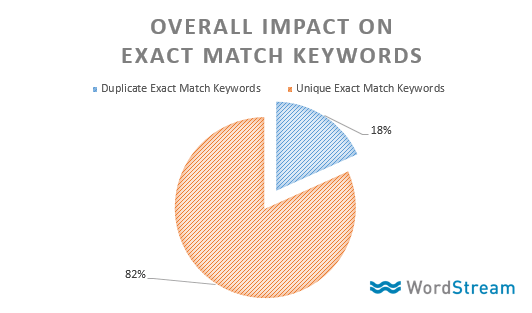
If you advertise on AdWords, you probably use Exact Match keywords.
If you use Exact Match keywords, you probably know that Google recently changed how they define “Exact.” What you might not realize is that this change could have a [LEVEL OF FEAR MONGERING] on your account.
Whether used to bid on branded terms, top-performers, or product-names appended with high-intent modifiers, Exact Match keywords were the lynchpin of many an AdWords account; their, well, exactitude, provided ROI where broader match types might have raked in unqualified riff-raff.
But things done changed.
How Have Exact Match Keywords Changed?
In the good ol’ days (read: weeks ago) Exact Match keywords only matched out to two things:
- Parallel search queries (the keyword [buy aubergine crocs] would match the search query “buy aubergine crocs”)
- Close variants which, before mid-March, only included: misspellings, singular forms, plural forms, acronyms, stemmings (such as floor and flooring), abbreviations, and accents.
Since then, Exact Match has become less discerning.
Hmm.
Now, this may very well help some advertisers. The theory behind close variants was a good one. If you sell shiny baubles and bid on the Exact Match keyword “shiny bauble,” you may still want your ads to show when someone searches for “shiny bobles” or “shiny baubles“. Through close variants, Google eliminated an advertiser’s need to add oodles of keywords that, ostensibly, meant the same thing.
But while simultaneously lending busy advertisers a hand and “connecting more people with what they’re looking for” is a noble pursuit, that isn’t what “Exact” means.
Introducing: Exact-Enough Match Keywords
The new version of Exact Match keywords can match out to search queries that share the same words of that keyword, but in a different order.
EX.
The Exact Match keyword [men’s dress shirt] is now eligible to show ads for the exact search query men’s dress shirt and to the not-so-exact search query dress shirt men’s.
But wait, there’s more!
There are a handful of other cases in which Exact Match keywords can now be triggered by search queries that do not match the keyword exactly, all of which are contingent on the existence (or absence) of function words and “other words that often don’t impact the intent behind a query.”
What’s a function word?
Think back to fourth grade, somewhere between reading Holes and playing the recorder….
Function words include prepositions (such as “in,” “to,” “for”), conjunctions (such as “and,” “but,” and “or”), and articles (such as “a,” “an,” and “the”).
With this change, Exact Match will ignore, add, or remove function words to match similar search queries. So far it’s having the intended effect: Google reports that accounts have seen up to a 3% increase in clicks as a result.
Google’s justification for this change makes sense: function words rarely (if ever) have an impact on searcher intent; someone searching for “jobs in united states” is probably looking for the same information as someone searching for “jobs in the united states” or “jobs united states.”
Unfortunately, there are cases in which semantic match is inconvenient, counter-productive, and potentially costly.
Per our data scientist Mark Irvine,
Brand advertisers may notice their accounts struggle because of this change, particularly if their brand name includes a location or other common words. Consider The Copley Square Hotel bidding on the exact keyword of its brand name [The Copley Square Hotel]. To them, someone searching for the exact term “The Copley Square Hotel” is highly qualified brand traffic whereas someone searching for the term “Hotel by Copley Square” or even “Copley Square Hotel” is effectively a non-branded search.
The Aggregate Impact of Exact-Enough Match Keywords
Our marketing team’s dear sweet data guy, Josh, wrote a script to remove function words from the active Exact Match keywords of 100 client accounts.
By doing so, we ascertained what kind of impact the new, broader Exact Match might have on different sized AdWords accounts across an array of verticals.
The 100 accounts we used were selected at random and all exceed $1,000 in monthly spend. All metrics reflect performance during the 30-day period before March 23.
After stripping away function words, Josh de-duplicated the new data set to account for keywords which, thanks to the new, broader definition of “Exact,” have been rendered superfluous.
A quick note on the larger conversation on the impact of Exact Match changing. Our approach to this analysis differs significantly from that employed by Aaron Levy in his fantastic post, “What the data tells us about the death of exact match and its impact,” over on Search Engine Land (go check it out, it’s loaded with neat tidbits). Where Aaron focused his in-depth analysis on three individual accounts, we tried to get the view from 10,000 feet. In the coming weeks, we’ll be digging into a few individual accounts that have seen a particularly large impact from the match type changes: stay tuned!
Before jumping into the high-level overview, here are some quick-hits:
- Of the 100 randomly selected accounts, only 67 had active Exact Match keywords
- In total, we analyzed 3,399 active Exact Match keywords
- On average, each account contained 9 exact match keywords that were stripped away during deduplication
41% of Exact Match Keyword Spend Was Impacted
Our data set consisted of just under $69,000 in Exact Match keyword spend over the course of 30 days; of that $69k, 41% was spent on keywords that, today, Google would consider duplicates.
While we found that the majority of the money spent on active Exact Match keywords (59%) was unimpacted by the change (meaning our advertisers are doing a solid job taking advantage of close variants and adding negative keywords), that still leaves a substantial chunk of money unaccounted for. In fact, that’s about $422 per account analyzed that AdWords will now allocate to close-ish keyword auctions.
I don’t know about you, but I’d much rather have full control over my four hundred and twenty-two hard-earned advertising dollars.
36% of Exact Match Keyword Impressions Impacted
Previously, impressions tied to Exact Match keywords meant that a search query was a literal doppelganger or a close variant (see previous section for a breakdown).
We determined that, out of the 1,080,989 impressions tied to Exact Match keywords in the accounts analyzed, 36% were for keywords that, for all intents and purposes, have been rendered irrelevant.
Consequently, this means that 36% of these Exact Match keywords are now competing in the same auctions— for the same impressions— as the other Exact Match keywords in these accounts.
This has the potential to frustrate advertisers on two fronts.
First, it makes account management more difficult. Not knowing that you have duplicate keywords is a pain, but figuring out where they are and if they’re costing you money can be a massive investment of time, too.
More importantly, though, by bidding on multiple keywords vying for SERP real estate in the same auction, you can drive up your own CPC’s for each keyword.
No thank you.
18% of Exact Match Keywords Impacted by Google’s Shift Towards Semantic-Match
Overall, across the 100 accounts we analyzed, Josh identified that, when stripped of function words, 18% of all Exact Match keywords were now considered duplicates of at least one other Exact Match Keyword.
I already touched on the fact that this means your keywords are competing against themselves. What I didn’t mention was that, when it comes to AdWords, the “best” option won’t always win.
If you’ve got three Exact Match keywords, all of which are competing in the same auction, Google will not automatically choose the keyword that has the best CPC or conversion rate. If you had maximum control over your keywords, you probably would. As such, it’s important to understand that, while 18% might not sound like much in the abstract, a change that impacts nearly one fifth of your Exact Match keywords has the potential to increase your costs and decrease your ad’s relevance to a searcher.
What to do about the Exact Match Keyword changes
First: my sincere apologies for making you read the phrase “Exact Match keyword” 327 times.
As you continue to wrap your head around Google’s new version of Exact Match keywords, watch your Search Terms Report (or QueryStream) like a hawk. Look at your most popular Exact Match keywords. Are they made up of single words or are they long-tail phrases? If your keywords include multiple words, write down each word of that keyword and then write out every permutation of those words in different orders.
In the event any of those re-ordered search terms are irrelevant to your business, add them as negatives and adjust bids so that your top performing keywords receive their fair share of your overall budget and let newly useless terms fade into the ether.
Looking for more information? Check out our live webinar happening TODAY on the 3 most important things you need to know about the changes to Exact Match keywords, hosted by Senior Data Scientist Mark Irvine.
Data Sources
Data is based on analysis of 100 AdWords accounts (WordStream customers) spending more than $1/month chosen at random from our customer base. All account metrics represent performance from the 30 days prior to March 23, 2017.














